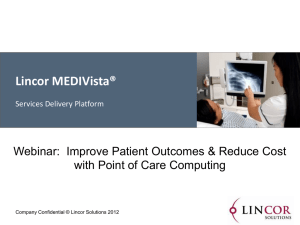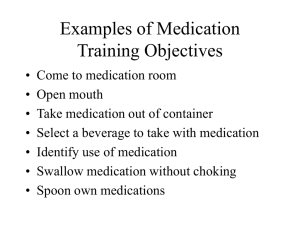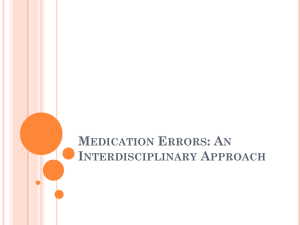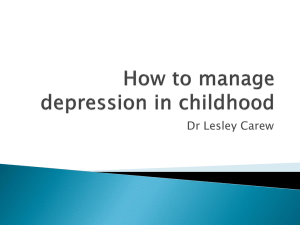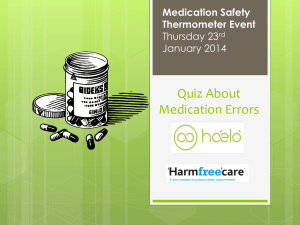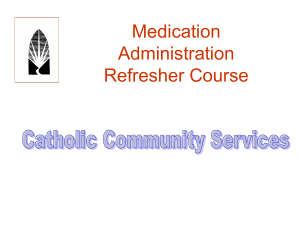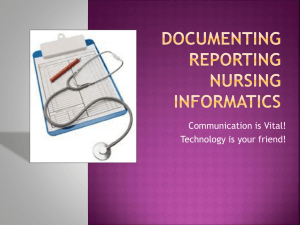Building Bridges in Medication Management
advertisement
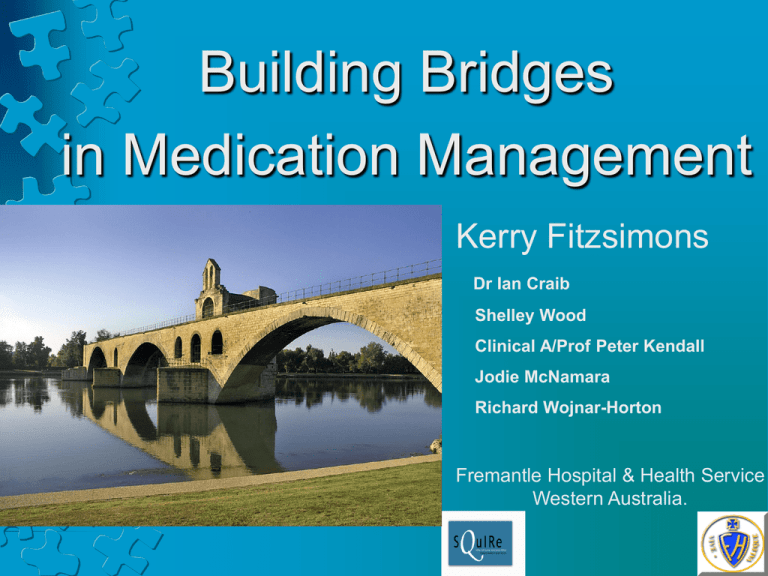
Building Bridges in Medication Management Kerry Fitzsimons Dr Ian Craib Shelley Wood Clinical A/Prof Peter Kendall Jodie McNamara Richard Wojnar-Horton Fremantle Hospital & Health Service Western Australia. Medication Errors can occur when • Determining the medication the patient is currently taking, • Transcribing details to the medication chart, • Prescribing medications for the patient during the admission, and • Communicating changes at discharge to community practitioners. Kerry Fitzsimons 2010 Why Change Our Pharmacy Service ? • High discrepancy rates between electronic discharge summary (EDS) and discharge medications. • Team pharmacist to be more involved in discharge process. • Team pharmacist to input medication information into discharge summary. Kerry Fitzsimons 2010 SQuIRe Medication Reconciliation Project Safety and Quality Investments for Reform (Office of Safety and Quality Dept Health WA) Kerry Fitzsimons 2010 Aim: • To evaluate an extended clinical pharmacy service involving: • Medication reconciliation on admission, • Medication reconciliation at discharge (EDS), • Facilitating seamless transfer of medication information to GP. • To gauge whether provision of a medication profile to patients was beneficial. Kerry Fitzsimons 2010 Initial goals To achieve: • 100% compliance of Medication Reconciliation Process • 100% satisfaction with service • from Medical Team • patient and • GPs • To assess impact on workload of service and ascertain feasibility of extension of project. Kerry Fitzsimons 2010 Method: Clinical pharmacist assigned to a designated medical team: • Obtain accurate medication history • Document current medications on front of chart • Reconciliation of medications with medical staff • Input medication information into the D/C summary • Provide medication information to patient including: • MedProf © to patients discharged home • Medication list to patients discharged back to N/H or hostels Kerry Fitzsimons 2010 Method: Data Collection • Audit Tool Designed • Baseline data collected • Data collected at monthly intervals (n=30) • Assessment using an audit tool • Active arm (1 year) • Control arm (4 months) • Roll-out and continuous quarterly reporting • Outcome Measures Kerry Fitzsimons 2010 • Medication discrepancy rates on admission and at discharge. • Satisfaction survey to GPs and patients. Results: Obtaining a Comprehensive Medication History on Admission (Mar 2007 - Feb 2008) 1. % Level of Compliance 100 80 60 40 Active 20 Control 0 Mar Apr May Jun Jul Aug Sep Month Kerry Fitzsimons 2010 Oct Nov Dec Jan Feb Results: 1. Obtaining a Current Medication History on Admission (Active Group) March 2007 - Nov 2009 Level of Compliance (%) 100 80 60 40 20 0 Jan Feb Mar Apr May Jun Jul Aug Sep Oct Nov Dec Month 2007 Kerry Fitzsimons 2010 2008 2009 Results: 2. Kerry Fitzsimons 2010 Results: 2. Confirmation of the Medication History March 2007 - Nov 2009 Level of Compliance (%) 100 80 60 40 20 0 Jan Feb Mar Apr May Jun Jul Aug Sep Oct Nov Dec Month Kerry Fitzsimons 2010 2007 2008 2009 Results: 3. Kerry Fitzsimons 2010 Results: Reconciliation on Admission Documented on NIMC March 2007 - Nov 2009 3. Level of Compliance (%) 100 80 60 40 20 0 Jan Feb Mar Apr May Jun Jul Aug Sep Oct Nov Dec Month 2007 Kerry Fitzsimons 2010 2008 2009 Results: Discrepancies Rates and Percentage of Discrepancies Corrected CONTROL GROUP Discrepancy Rates and Percentage of Discrepancies Corrected ACTIVE GROUP 100 100 80 80 60 60 % % 40 40 20 20 0 0 Mar Apr May Jun Jul Aug Sep Oct Nov Dec Jan Feb Month % Patients with Medication Discrepancies % Discrepancies Rectified Mar Apr May Jun Jul Aug Sep Oct Nov Dec Jan Feb Month % Patients with Medication Discrepancies % Discrepancies Rectified Results: 4a. Kerry Fitzsimons 2010 Results: 4a. Reconciliation at Discharge Discharge Summary = Discharge Medications Prescribed March 2007 - Nov 2009 Level of Compliance (%) 100 80 60 40 20 0 Jan Feb Mar Apr May Jun Month Kerry Fitzsimons 2010 Jul Aug Sep Oct 2007 2008 Nov Dec 2009 Results: 4b. Kerry Fitzsimons 2010 Results: 4b. Documented Medication Liaison March 2007 - Nov 2009 Level of Compliance (%) 100 80 60 40 20 0 Jan Feb Mar Apr May Jun Jul Aug Sep Oct Nov Dec Month 2006/07 Kerry Fitzsimons 2010 2007/08 2008/09 Patient Satisfaction Questionnaire Feedback from patients (n=43) • 79% very satisfied with discharge medication list and found it helpful, • 58% had shown their GP, • only 14% reporting problems with taking their medication. Kerry Fitzsimons 2010 GP Satisfaction • Letter to Fremantle Division GPs to outline project. • Poor response – All were satisfied or very satisfied • Comments include: “All patients should receive this service” • Letters supporting the project from • GP Aged Care representative and Kerry Fitzsimons 2010 • Fremantle GP Network Medical Staff Satisfaction Consultants to interns – all very happy to support continuation of service • No official survey - feedback very positive • Interns – “makes my job much easier” • Improved clinician awareness of • medication histories • medication discrepancies Kerry Fitzsimons 2010 • the need for accurate communication at discharge. Future of Project • Funding for service. • Roll-out project to other medical teams initially and then to other specialities. • Highlight need for reduced Pharmacist : Patient ratios (1:30) to meet all requirements of Pharmaceutical Review Process Kerry Fitzsimons 2008 Conclusion An extended clinical pharmacy service with adequate staffing ratios (1:30) improved: • The medication reconciliation process, • The accuracy of the medication information communicated to GPs. • Empowered patient by providing a medication list at discharge, and • Support for continuation of service from GPs, medical staff and patients. Kerry Fitzsimons 2010 Bridging the Divide • Narrowing the community – hospital divide. • Enhanced alliances between practitioners. • Facilitating accurate medication histories – improved communication. (GPs, CPs, ACF) • Liaising with GP Networks Clinical pharmacists providing seamless continuity of care. Kerry Fitzsimons 2010 Pharmacy Department Medication Section of Fremantle Hospital and Health Service Alma Street, FREMANTLE 6160 (PO Box 480 FREMANTLE 6959) Telephone 08 9431 2777 Medication Profile ALLERGY: AMOXYCILLIN (rash) 11 June, 2008 Name: Mrs S You have been prescribed the following medication. This information will help you use it safely and effectively. MedicationName Atorvastatin Tablets 40 mg Other Names Midday Evening Lipitor Isosorbide Duride Electronic Mononitrate Imdur Tablets 60 mg Monodur Discharge Imtrate Enalapril Tablets 5 mg Number to Take Morning Renitec Amprace Summary Betaloc Metoprolol Tablets 50 mg Lopressor (EDS) Metohexal Bedtime 1 1 1 Minax Aspirin Tablets 100 mg EC Astrix Cartia Glyceryl Anginine Trinitrate Tablets sublingual 600 microgram To lower cholesterol levels in the blood. For relief from angina, or to improve pumping of the heart. 1 1 Purpose for Medication 1 Dissolve HALF to ONE tablet under the tongue when needed for chestpain. For reducing high blood pressure, or to improve pumping of the heart or to prevent kidney problems. For treatment of high blood pressure, angina or disturbances of heart rhythm. To thin the blood and prevent heart attack or stroke To relieve chest pain associated with angina. Special Instructions Take at night about half an hour before bedtime. Follow dietary instructions closely. Keep all doctors appointments. Stomach upset may occur. Contact your doctor if muscle pains or weakness occur. Do not crush tablets, but they may be broken in half if required. If dizziness occurs, do not rise quickly from sitting or lying down. May cause headache and mild stomach upset. See your doctor if this is a problem. Take regularly and don't miss doses. Lie down after a dose if dizziness is a problem. This should only happen with the first few doses. Avoid potassium supplements unless advised by your doctor. Space doses away from antacids. May cause cough, changes in taste, rash or stomach upset. Contact your doctor if these are troublesome. Take regularly, with food. Do not suddenly stop taking this medication. Special caution needed in diabetics and asthmatics. May affect sexual ability, or cause unpleasant dreaming. See your doctor if this is a problem. Swallow whole after food. May irritate stomach ulcers and may worsen asthma or hayfever in some people. See your doctor if these are troublesome. Dissolve tablets under the tongue. Do not swallow. You may experience flushing, headache or faintness. Alcohol may worsen headaches. See your doctor if these are troublesome. Read the information sheet provided for further details. Medication Profile Pharmacy Department Fremantle Hospital and Health Service Alma Street, FREMANTLE 6160 (PO Box 480 FREMANTLE 6959) Telephone 08 9431 2777 Medication Profile ALLERGY: AMOXYCILLIN (rash) 11 June, 2008 Name: Mrs S You have been prescribed the following medication. This information will help you use it safely and effectively. MedicationName Other Names Atorvastatin Tablets 40 mg Lipitor Isosorbide Mononitrate Tablets 60 mg Duride Imdur Monodur Imtrate Renitec Amprace Enalapril Tablets 5 mg Number to Take Morning Metoprolol Tablets 50 mg Betaloc Lopressor Metohexal Minax Aspirin Tablets 100 mg EC Astrix Cartia Glyceryl Trinitrate Tablets sublingual 600 microgram Anginine Midday Evening Bedtime 1 To lower cholesterol levels in the blood. For relief from angina, or to improve pumping of the heart. 1 1 1 Purpose for Medication 1 1 Dissolve HALF to ONE tablet under the tongue when needed for chestpain. For reducing high blood pressure, or to improve pumping of the heart or to prevent kidney problems. For treatment of high blood pressure, angina or disturbances of heart rhythm. To thin the blood and prevent heart attack or stroke To relieve chest pain associated with angina. Special Instructions Take at night about half an hour before bedtime. Follow dietary instructions closely. Keep all doctors appointments. Stomach upset may occur. Contact your doctor if muscle pains or weakness occur. Do not crush tablets, but they may be broken in half if required. If dizziness occurs, do not rise quickly from sitting or lying down. May cause headache and mild stomach upset. See your doctor if this is a problem. Take regularly and don't miss doses. Lie down after a dose if dizziness is a problem. This should only happen with the first few doses. Avoid potassium supplements unless advised by your doctor. Space doses away from antacids. May cause cough, changes in taste, rash or stomach upset. Contact your doctor if these are troublesome. Take regularly, with food. Do not suddenly stop taking this medication. Special caution needed in diabetics and asthmatics. May affect sexual ability, or cause unpleasant dreaming. See your doctor if this is a problem. Swallow whole after food. May irritate stomach ulcers and may worsen asthma or hayfever in some people. See your doctor if these are troublesome. Dissolve tablets under the tongue. Do not swallow. You may experience flushing, headache or faintness. Alcohol may worsen headaches. See your doctor if these are troublesome. Read the information sheet provided for further details.

